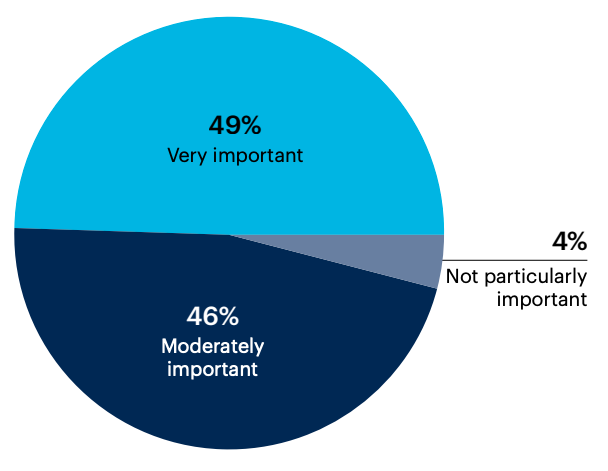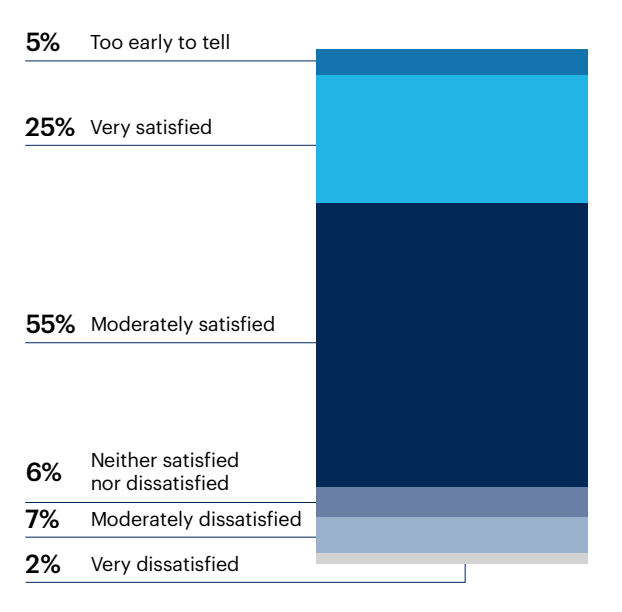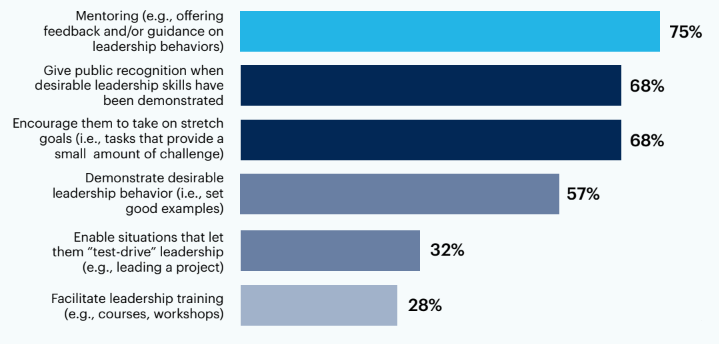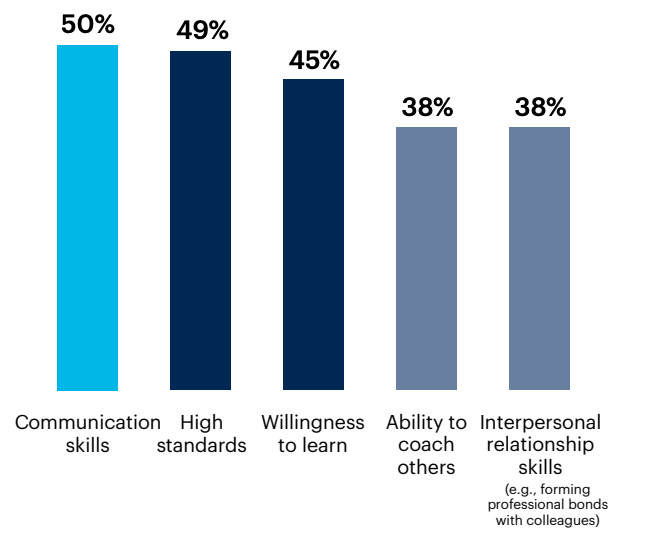Fostering Leadership in Tech
Leaders own the strategy and execution behind any tech organization’s goals. How do today’s leaders share their knowledge and help the next generation develop their skills? Read on to find out.
One minute insights:
 Tech leaders believe that leadership development is important
Tech leaders believe that leadership development is important Authoritative leadership is common
Authoritative leadership is common Many leaders use mentoring to help direct reports develop leadership skills
Many leaders use mentoring to help direct reports develop leadership skills Communication skills are a key indicator of future leadership potential
Communication skills are a key indicator of future leadership potential Pressure to achieve results can present a challenge to fostering leadership
Pressure to achieve results can present a challenge to fostering leadership
Tech leaders believe that leadership development is important, but most organizations only provide training to current leaders

95% of respondents believe that leadership development is important in their organization.
How important is leadership development in your organization?
Not at all important 0%, Not sure 0%
n = 300
For 63% of respondents, leadership training is only provided to people already in leadership positions. 26% provide this training to all employees.
Does your organization provide leadership training (e.g., courses, workshops, conferences)?


Most (80%) respondents are satisfied with their organization’s leadership style.
Are you satisfied with the leadership style at your organization?
n = 300
Mentoring and training people is critical to the survival of the organization. If people do not have the proper skill set, then they are not prepared for expanded roles. And succession planning is not possible.
Leadership training and coaching should be available for all employees. Every employee should be involved in [projects] where they can learn and demonstrate leadership skills.
Many respondents have an authoritative leadership style, which is also common throughout their organization
More than one-third (35%) of respondents said an authoritative leadership style is dominant in their organization. Authoritative leaders create a vision and let their reports find their own way to execute it.
What’s the dominant leadership style at your organization?

27% of respondents said their personal leadership style is authoritative. 24% identified themselves as affiliative leaders (who value a people-first culture) and 23% said they take a democratic approach and involve others in decision-making.
From the same list, what is your dominant leadership style?

If I demonstrate authenticity and foster transparency it’s fair to expect that from my reports. If I roll up my sleeves to help out a team member, it's more than fair that my team picks that up. Just like a child observes a parent’s behaviour to pick things [up], leaders must walk the talk and present their authentic self.
Model good behaviour and be generous with your time.
Mentoring is the most popular approach for helping direct reports develop leadership skills
Respondents chose mentoring (75%) as their go-to approach to helping direct reports develop their leadership skills. Giving public recognition (68%) and encouraging reports to take on stretch goals (68%) are also popular tactics.
What do you do to help direct reports grow their leadership abilities?

None of these <1%, Other <1%
n = 300
92% of C-suite executives, VPs and directors enjoy helping others develop their leadership skills.
Do you enjoy helping others develop leadership skills?

Believe in your team members; nurture and give them opportunities to show and grow.
A strong leadership bench helps to overcome attrition challenges when things go wrong.
Pressure to achieve results presents a barrier to fostering strong leadership
More than half (52%) said that pressure to achieve results makes it challenging to foster strong leadership in their organization. Other challenges include lack of bandwidth (45%), poor examples from the top of the company (42%) and talent attrition (42%).

What are the top challenges to fostering a strong leadership culture at your organization?
No incentives to be a better leader 25%, Lack of training resources 19%, Lack of leadership vision 19%, None of these 2%, Other 1%
n = 300
[Fostering leadership skills] can be very hard. People respond in differing ways so you have to often craft an approach very individually.
The whole ‘Work-from-Home’ shift is making this much harder; we are struggling to adjust our approach.
Current tech leaders look for communication skills as a key indicator of leadership potential

Communication skills (50%) were the top-picked identifier of future leaders. High standards (49%) and willingness to learn (45%) were also important leadership identifiers for respondents.
What factors are most important to you when identifying future leaders?
Technical skills 35%, Emotional intelligence (e.g., empathy) 31%, Business understanding 22%, Loyalty to the company 19%, Accountability 12%, None of these 0%, Other 0%
We follow in the philosophy of ‘leaders develop leaders.’ Our approach is to identify leaders early and invest in their development, show them the career path, give them an option to make a choice between SME or Individual Contributor path and then coach them accordingly.

Want more insights like this from leaders like yourself?
Click here to explore the revamped, retooled and reimagined Gartner Peer Community. You'll get access to synthesized insights and engaging discussions from a community of your peers.
Respondent Breakdown
